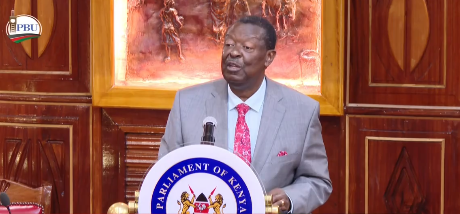

Prime Cabinet Secretary Musalia Mudavadi has confirmed that 4,993 Kenyan refugees in Ethiopia’s Dillo and Megado towns have expressed interest in returning home.
Dillo and Megado are refugee settlements in the Borana Zone of Oromia State, Ethiopia, hosting Kenyan refugees who fled the country due to ethnic clashes that started in 2000, leading to the Turbi massacre in 2005.
These settlements face prolonged challenges, particularly in water and sanitation, due to their remote locations and insufficient infrastructure, complicating support efforts for aid organizations.
Mudavadi emphasised that while the government would facilitate their repatriation and reintegration, no compensation would be provided.
“The Kenyan and Ethiopian governments should engage in consultations facilitated by the UNHCR regional bureau and local UNHCR offices,” Mudavadi told the Senate on Wednesday.
The Prime CS stated that before repatriation begins, Kenya must address where the refugees will be resettled, how they will be accommodated, and provide security mechanisms for their safety. He stressed that those born in Kenya need assurances that they will be granted Kenyan nationality.
Mudavadi detailed that there are 2,060 refugees in Dillo and 3,600 in Megado who fled Kenya and settled in the neighboring country.
“In terms of households, there are 1,250, with a total of 5,671 individuals—2,788 male, 2,883 female, and 3,385 children,” Mudavadi said.
Kakamega Senator Boni Khalwale questioned why the government was delaying the refugees' return, given that the UNHCR is ready to facilitate the process.
“Over 4,000 refugees have expressed their desire to return home. The UNHCR is ready and willing to fund the programme, and the refugees have identified where they want to go. Where is the problem?” Khalwale asked.
Senators also sought clarification on the measures the government is taking to integrate returning refugees into Kenyan communities.
Turkana Senator James Lomenen expressed concern that host communities had not been adequately involved in the process, leading to potential conflicts and hostility.
“Enough time has not been given to host communities to be informed about how they can integrate with the refugees, and that is creating conflict and hostilities,” Lomenen said.
Marsabit Senator Mohamed Chute criticised Mudavadi’s response, saying it was rhetorical and lacked clear timelines for repatriation.
“I want the CS to tell us when the last time people from his office visited these refugees,” Chute said.










![[PHOTOS] Ruto's warm reception in Maua, Meru](/_next/image?url=https%3A%2F%2Fcdn.radioafrica.digital%2Fimage%2F2025%2F04%2F04296e3b-128d-4538-9d57-9475bcca83e9.jpg&w=3840&q=75)
